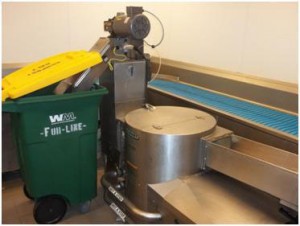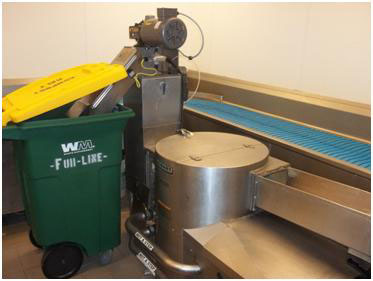
The University of Rochester is always looking to find new ways to be more sustainable. From Team Green, to solar compactors, and LEED certified buildings, we are a true leader in sustainability initiatives. Recently, the University has restarted its efforts in composting food waste.
According to the U.S. Environmental Protection Agency, “The United States generates more than 34 million tons of food waste each year. Less than three percent of the 34 million tons of food waste generated in 2010 was recovered and recycled. The rest —33 million tons— was thrown away. Food waste now represents the single largest component of MSW [municipal solid waste] reaching landfills and incinerators.” These statistics are alarming considering the fact that composting seems to be the latest trend. Composting offers the perfect solution to keep organic material out of our landfills; it breaks it down to a form that can be reused beneficially to the earth.
What exactly do we mean by stating that the efforts have been “restarted”? The University was previously involved in a composting program which ended nearly a year ago. However, last fall, the school resumed its composting efforts through the help of our trash and recycling hauler, Waste Management. According to Antonio Pignagrande, Campus Executive Chef, “This program is more sustainable since Waste Management has a partnership with the University”. Waste Management is piloting a new local compost operation with material solely from the University, so this truly is a unique opportunity for us.
Both pre-consumer and post-consumer material is being collected. In the kitchens behind the scene of the dining halls, any trim or food waste generated before food is served is considered pre-consumer waste. However, cooks are still encouraged to use as much as possible since waste reduction is even more beneficial than composting.
Post-consumer material is currently collected at Danforth Dining Hall. Students first place their plates on tray belts and from there the food scraps and napkins are thrown into a food trough. This waste then goes through a pulper machine that chips it and empties it directly to compost bins (see picture). This process is not as easy as it seems since employees have to be constantly on the lookout for cutlery in the bins or other contamination. Staff training is a necessary component to the program’s success.
According to Waste Management, acceptable items for food and organic recycling include: Fruits, Vegetables, Meat, Poultry, Seafood (bones and shells), Bakery Items, Eggs, Paper Egg Cartons, Milk, Juices, Cartons, Plants, Cut Flowers, Potting Soil, Coffee Grounds, Filters, Tea Bags, Paper Products (napkins and paper towels), Ice Cream, Yogurt and Cottage Cheese.
The University currently composts about 2.2 tons of food waste per week with a total of nearly 27 tons collected from August through December. This system prevents all of this waste from going to a landfill!
Just think, the orange you peeled a few days ago, the salad you did not finish at dinner, and the potato skins from the mashed potatoes you had for lunch, all could be composted. This waste accumulates over time. According to a study at University of Arizona (Tuscon) forty to fifty percent of all food ready for harvest never gets eaten. The United Nations Food and Agriculture Organization (FAO) also reports that roughly one-third of the food produced worldwide for human consumption is lost or wasted, amounting to some 1.3 billion tons per year.
For more information on composting, see the links below:
http://www.epa.gov/epawaste/conserve/rrr/composting/index.htm



I do read a lot of posts about composting being “the future” of food waste, but i see a lot of people and bigger organizations that are throwing hundreds of kilograms of food and do not have that “modern thinking”. We should really educate ourselves and start doing the right thing, which means composting.
Composting is the most sustainable option for managing organic waste. Composting food waste and other acceptable organic waste at a licensed composting facility produces a beneficial product using feedstock that is otherwise wasted in the landfill.
A landfill has a limited life, but a composting plant can continue to process waste indefinitely. By taking responsibility for diverting recoverable waste produced by your organization, you are helping to improve the sustainability of the region.
Composting is the most sustainable option for managing organic waste. Composting food waste and other acceptable organic waste at a licensed composting facility produces a beneficial product using feedstock that is otherwise wasted in the landfill.
A landfill has a limited life, but a composting plant can continue to process waste indefinitely. By taking responsibility for diverting recoverable waste produced by your organization, you are helping to improve the sustainability of the region
This is an issue that needed dwelling into, I’m glad we have this article and people working on it.